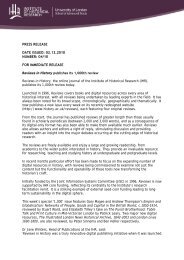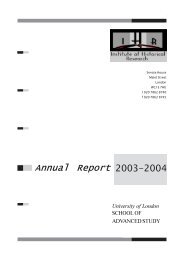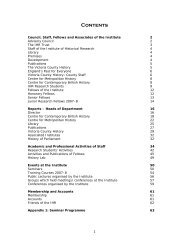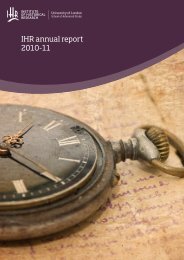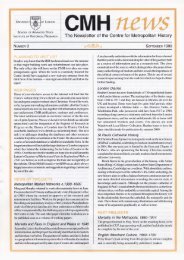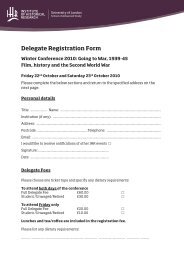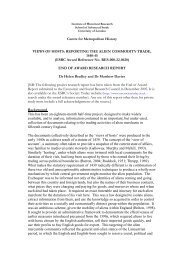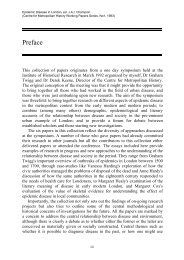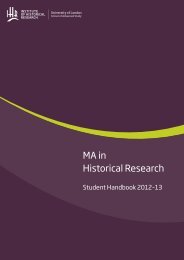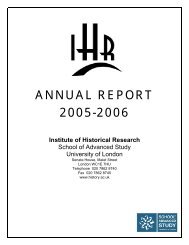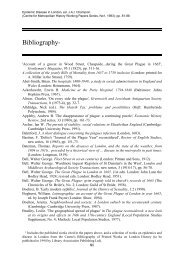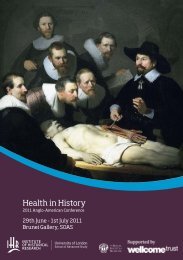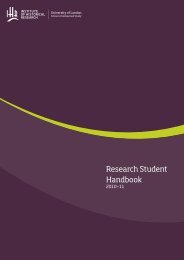CMH AnnuAl RepoRt 1999â2000 - Institute of Historical Research
CMH AnnuAl RepoRt 1999â2000 - Institute of Historical Research
CMH AnnuAl RepoRt 1999â2000 - Institute of Historical Research
You also want an ePaper? Increase the reach of your titles
YUMPU automatically turns print PDFs into web optimized ePapers that Google loves.
Director’s Report<br />
fairs in thirteenth-century England’, in which from November 2000 Samantha<br />
investigates the political economy <strong>of</strong> markets and fairs. The gazetteer reveals<br />
that while there was clearly an immense demand for new trading institutions,<br />
the incidence <strong>of</strong> grants <strong>of</strong> market privileges and the management <strong>of</strong> markets by<br />
their owners was heavily influenced by political factors, including patronage,<br />
warfare and the local interests <strong>of</strong> landowners.<br />
The new history <strong>of</strong> St Paul’s Cathedral, sponsored by the Dean and Chapter,<br />
makes steady progress. Several authors have already contributed drafts <strong>of</strong> their<br />
chapters, well in advance <strong>of</strong> the timetable. During the year Chris Faunch made<br />
an important contribution as research assistant to the history by investigating<br />
some <strong>of</strong> the less accessible sources and the immense collections <strong>of</strong> illustrative<br />
material, as she reports below.<br />
Perry Gauci’s book arising from his research at the Centre into ‘English merchant<br />
culture, 1660-1720’ will be published by the Oxford University Press in March<br />
2001. A significant event <strong>of</strong> the year will be the publication, in December 2000,<br />
<strong>of</strong> Craig Spence’s London in the 1690s: A Social Atlas, which presents an<br />
overview <strong>of</strong> the findings from one <strong>of</strong> the early large projects at the Centre and<br />
serves as an introduction to the substantial database drawn from tax records <strong>of</strong><br />
the period. The database is available for consultation at the Centre.<br />
Several <strong>of</strong> the Centre’s applications for funding for future projects were<br />
unsuccessful. However, we continue to pursue our objective, in association<br />
with colleagues in institutions outside London, <strong>of</strong> promoting long-range<br />
interdisciplinary investigation <strong>of</strong> the interaction between regional, metropolitan<br />
and national identities up to the present. Another important area for development<br />
will be to make new sources for London history and related themes more widely<br />
available, along with data arising from former research at the Centre. Experience<br />
with the gazetteer <strong>of</strong> markets and fairs points to ways <strong>of</strong> doing this. There have<br />
been other developments too, on which it will be possible to report next year.<br />
Following the intensive cluster <strong>of</strong> conferences and workshops organised in the<br />
summer <strong>of</strong> 1999, the Centre adopted a more extended programme for this year.<br />
We collaborated with the CORN (Comparative Rural History <strong>of</strong> the North Sea<br />
Area) group in organising a conference on food production and trading relations<br />
between town and country, held in Ghent in December 1999. In collaboration<br />
with the Corporation <strong>of</strong> London and the Museum <strong>of</strong> London we organised a<br />
conference in April 2000 — on the eve <strong>of</strong> the election <strong>of</strong> the new mayor <strong>of</strong><br />
London — on the governance <strong>of</strong> London over the last thousand years. The



